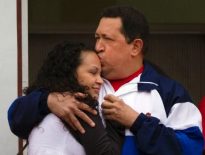By Jonny Hogg
KINSHASA (Reuters) – Failure to reform Democratic Republic of
Congo’s large and ill-disciplined army has kept much of the civilian population in poverty and insecurity despite billions
of dollars of foreign aid, international and Congolese NGOs said on Monday.

February 9, 2009. REUTERS/T.J. Kirkpatrick/Pool
Nearly a decade after the official end of Congo’s war, the armed forces,
known as FARDC, have failed to stamp out rebel groups and militias in the east of the country, and troops are regularly
accused of abuses, including killings and mass rape.
Many of the 150,000 soldiers the central African country has in
its army are former rebels who lack basic training and target civilians because they are not properly paid or
housed.
A report by non-governmental organisations entitled “Taking a Stand on Security Sector Reform” criticised a
lack of political will to overhaul the army in the highest levels of the Congolese government, coupled with a failure by
donors to push for such action.
This failure to create security forces that can protect the population and are not
themselves human rights abusers is slowing progress on everything from tackling the recruitment of child soldiers to boosting
economic growth, the report added.
“The Congolese government … (has) allowed corrupt networks within the security
services to flourish, stealing the resources intended to pay basic salaries or profiting from exploitation of natural
resources,” said the report.
As a result, the delivery of more than $14 billion of international aid over 5 years had
ended up having “little impact on the average Congolese citizen,” the report noted, adding Congo is now bottom of the UNDP’s
development index.
One of Congo’s top military commanders rejected suggestions that army reform was failing and said
training by foreign partners like the United States and France had improved discipline and performance.
“Before, there
was no real army, today there is a sense of unity and morale,” General Jean Claude Kifwa told Reuters.
“There are
still some problems, but we’ve come a long way … The progress I’ve seen has been enormous.”
ILLEGAL MINING, “GHOST
SOLDIERS”
The NGOs that produced the report included the Open Society Initiative for Southern Africa (OSISA), Refugees
International and the Congolese human rights group ASADHO.
According to the United Nations, corruption in the army
includes Congolese troops running illicit mining operations in the east of the country. There is also a widespread problem of
non-existent so-called “ghost soldiers”, whose pay is then siphoned off illegally.
Last week, President Joseph Kabila
said he wanted to arrest Bosco Ntaganda, an ex-rebel who is now a general in the national army and is already subject to an
International Criminal Court (ICC) arrest warrant for war crimes.
Earlier this month, hundreds of soldiers loyal to
Ntaganda abandoned their posts, sparking bloody clashes with loyalist troops and allowing rebels to seize
territory.
But Kabila’s own fear of a strong army means he is a key obstacle to effective security sector reform,
according to Pascal Kambale, who is country manager in Congo for OSISA, and is one of the authors of the report.
“He
(Kabila) feels more comfortable with a disorganised army, he can manoeuvre them better than a trained one,” Kambale told
Reuters.
The international community should also be faulted for failing to push the government to carry out the army
reform and for investing in the wrong types of change, Kambale said.
Many donors had focused on technical schemes,
such as providing equipment, or training specific troops, rather than calling for sweeping changes in how the army is used
and run.
“It’s not rocket science to know that reforms of the security services in a post-conflict country like Congo
are more political than anything else … People have mistaken training for reform,” Kambale added.
A little over one
percent, or $85 million, of official development aid for the Congo was spent on direct security sector reform between 2006
and 2011, according to the report, which called for renewed efforts to address this area.
“All other objectives –
humanitarian, developmental, economic … will be difficult or impossible to perform without SSR (Security Sector Reform),”
it added.





